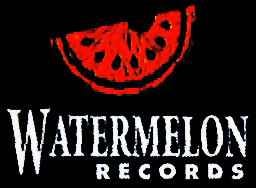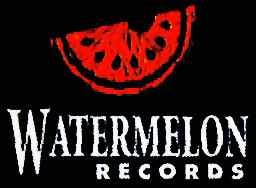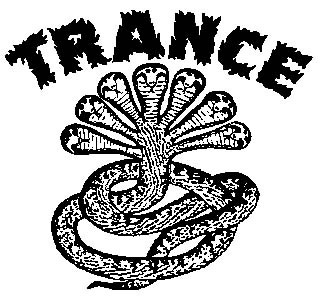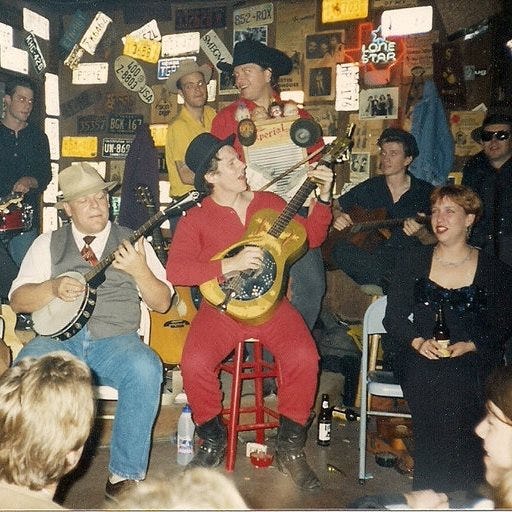Austin record labels of the '90s
Watermelon started so promising, but ended up in bankruptcy court
Nobody has ever even thought about calling Austin “the Recorded Music Capital of the World.” Though Domino Records had a hit with “You Cheated” by McCallum High grads the Slades in the ‘50s, and Sonobeat recorded- and sold- Johnny Winter’s first album The Progressive Blues Experiment in the ‘60s, there was little local label activity during Austin music’s “glory days” the next two decades. Willie Nelson had big plans for his Lone Star imprint, distributed by Columbia, but released just a few records (Bill Callery, Steve Fromholz, Ray Wylie Hubbard, the Geezinslaws) that went nowhere.
Mike Mordecai’s jazz label Fable debuted in 1975 with three LPs, by Starcrost, 47 Times Its Own Weight and Steam Heat- a trilogy that would find a cult of fans in Japan 25 years later, but not have much impact beyond Travis County on release.
Punk label Rabid Cat (Scratch Acid, Offenders) and Geoff Cordner’s Wrestler (Doctors’ Mob, Tailgators, Poison 13), were promising in the mid ‘80s, but didn’t make it past the late ‘80s.
The ‘90s was the city’s recording renaissance, with King Coffey’s Trance Syndicate making international noise with such albums as Heroin Man by the Cherubs (1994), WhatFunLifeWas by Bedhead (‘94), Backfeed Magnetbabe from Sixteen Deluxe (1995) and the self-titled debut …And You Will Know Us By the Trail of Dead (1998).
"All we ever wanted to do was tour, and having a record on Trance gave us, like, this stamp of approval,” said Conrad Keely of Trail of Dead. “Sometimes, the name of the label was bigger on the posters than the name of the band because people who liked one Trance band usually liked all of them."
Chicago label Touch and Go handled manufacturing and distribution, so King and his partner Craig Stewart could concentrate on the music.
But this blissful arrangement fell apart in 1998, when Capitol Recording Artists the Butthole Surfers sued Touch and Go for their their back catalog and won. Though Coffey was against the lawsuit, his name was on it as a Butthole Surfer, so T&G cut ties. And T. S. closed shop.
Jeff Cole’s Doolittle Records also had a nice run in the ‘90s, putting out records by Meredith Miller, Prescott Curlywolf and Hamell On Trial in 1992, and following up with releases by Trish Murphy, Slobberbone and the Bottlerockets. But Cole was burned out by 2000 and the label merged with New West.
San Marcos-based Dejadisc put out some good music from ‘92-’96, especially that sensational Jo Carol Pierce tribute LP Across the Great Divide (1992) and Wayne “the Train” Hancock’s 1995 debut Thunderstorms and Neon Signs. But cash flow problems were deja vu all over again.
Launching in 1987, blues label Antone’s Records released strong projects by Toni Price, James Cotton, Doug Sahm, Sue Foley, Omar and the Howlers, and Dreams Come True by Marcia Ball, Angela Strehli and Lou Ann Barton. For two years in the early ‘90s Antone’s had the dos Records spinoff, managed by Harry Friedman, which put out Burning Daylight by Loose Diamonds, Stray Dog Talk by David Halley and Stephen Bruton’s What It Is, among other non-blues LPs.
Antone’s kept going in hard times, thanks to angel investor Jimmy Heldt (the son of the attorney who won a $10 billion judgement for Pennzoil in its suit against Texaco), but he finally said enough when it became obvious the label would never become solvent. Every music fan’s dream is to own a record label, but losing money gets old.
The dominant record label in Austin in the ‘90s was Watermelon, which helped expand the scope of Texas music to the world. The ‘melon was prolific, putting out an average of 12 albums a year, including career-making releases by Tish Hinojosa, the Derailers, the Gourds, Monte Warden, and Asylum Street Spankers.
The idea, Geissler said in '89, was for Watermelon to become to the Southwest what Rounder was to the Northeast -- a regional label that would provide a haven for great roots musicians and singer-songwriters. When Watermelon gave the world its first exposure to senior citizen yodeler Don Walser, the dark solo sentiments of Alejandro Escovedo and the pure town hall rockabilly of High Noon, the label was on its way. But where Rounder had the multi-million selling success of Allison Krauss, Watermelon never did have a breakout artist whose windfall paid for all the other acts.
On the last day of 1998, Watermelon declared Chapter 11 bankruptcy. Then came a messy battle for ownership of master recordings. Bad debt trumped good intentions.
The label was just too ambitious for its income, signing such commercially allergic acts as Bob Neuwirth, Hayseed, Duane Jarvis and Eric Taylor, even while months behind on the rent. They begged their CD manufacturer to continue production, when the past-due amount was $60,000. Besides owing musicians a combined $119,000 in royalties, Watermelon had a $200,000 debt to music publishers. They even stiffed Billboard columnist Chet Flippo $250 for his liner notes to Doug Sahm’s S.D.Q. ‘98. The label became known as Deadbeat Records.
The wheels fell off in October '98, when the label’s Nashville-based publicist Lisa Shively won a $50,000 judgment against Watermelon and attached its bank account. Then, Watermelon's distributor, Sire Records, laid claim to the label's master tapes and licenses, after Geissler offered them up for collateral against money owed. Running a record label sometimes resembles a gambling addiction.
Sire had advanced Watermelon $200,000 in Oct. '97, which they would recoup at an inflated rate of 23 percent of gross sales. Sire handled distribution and income, plus the deal allowed Sire to cherry-pick the most commercially-viable artists -- Don Walser and the Derailers. “We came up with the idea of 'uplift artists,' where Sire could take them to the next level,” Geissler told me in 1999. “But we ended up having to let go of our best sellers.'' That’s the kind of loanshark deal you make to stay afloat.
Watermelon’s biggest year was 1996, when it grossed $950,000. By ‘98, that was down to $200,000. Geissler attributed some of the financial problems to Sire not giving Watermelon timely sales reports. When they finally got the disappointing figures they saw that their spending had far exceeded the income.
At the time of the bankruptcy, Watermelon’s only value was the master recordings. These are not just the original tapes, but the rights to release the music. Lawyer Cindi Lazzari, who’d been demanding accounting statements for her clients for years, was able to successfully sue to have the masters returned to Monte Warden, the Asylum Street Spankers and the Gourds. The Gourds didn’t know Lazzari- they worked with her husband Joe Priestnitz- so after she got them back Stadium Blitzer and Shinebox, they expected a bill. “She didn’t take anything,” said Kevin Russell. “She was strictly motivated by moral outrage.”
Lazzari negotiated big payouts to Austin garage bands Olive and Gomez from British major label acts that had also been using those names. But rather than take the standard 40% cut, she billed the bands by the hour. What a wonderful thing when a sharp attorney is a big music fan.
Lazzari's defining achievement came in 2005, when she guided legislation to expand the state's definition of artists to include musicians, thus protecting their CDs from bankruptcy seizure. One of the reasons the Damnations broke up is because a couple thousand copies of their Where It Lands CD were confiscated when their debt-ridden distributor got raided. Lazzari passed away in 2007 at age 52 after a 12-year battle with cancer. Her work is remembered each year in the Cindi Lazzari Artist Advocate Award.
Watermelon’s seeds were planted on an afternoon in 1989 when Geisler was awakened from a nap by a phone call from Robert Earl Keen. The musician and the German exporter of music and books had talked about the need for a label of Texas singer-songwriters. “The Austin Lounge Lizards have made this great record, but they can’t find a label to put it out,” Keen told Geissler, who followed his passion for Texas music to Austin just three years earlier. “Let’s do it.” Geissler then called Kunz, the Waterloo Records owner, who’d also expressed interest in starting a label, and the three formed a partnership to release the Lizards' Highway Cafe of the Damned in time for the '89 Kerrville Folk Festival.
As owner of the country's most-lauded independent record store, Kunz understood retail and Geissler had a pipeline to the roots-crazed Europeans who love anything Texas-related. Keen left within a year after a disagreement with Geissler, and Martin Reichold of Germany became the third partner.
Watermelon was soon pumping out an album every month, covering most genres of indigenous Texas music, from conjunto and Western swing to folk and blues and honky tonk and rock n’ roll. The first five years were magical, though the critical acclaim did not drive sales as expected. Critics don’t sell records- except the promos they receive in the mail.
Watermelon overestimated the demand for Austin music. The income was never where it needed to be to stay in business.
“A lot of musicians don't want to hear reality, they want to hear the cheery picture that Watermelon was so eager to present,'' said Matt Eskey, whose Freedom label rankled Geissler in '98 when it put out an EP by Asylum Street Spankers, who had released two albums on Watermelon. “But Watermelon couldn't back up its promises.''
Austin musician Jon Dee Graham was one of the lucky ones. Even though he'd heard unfavorable things about Watermelon, Graham found himself at the bargaining table with Geissler in September of 1998. “Heinz pitched an attractive offer,'' Graham said. “It was a good recording budget and there was a possible step-up to Sire, but just as the deal memo was being spit out by the computer, I mean just minutes before we were to sign, he said, 'Oh, one other thing. Because of our finances, we won't be able to get you any money until early '99.''' Rather than make the record out of his own pocket and hope to be reimbursed by a shaky label, Graham walked and made Summerland with New West, which had just moved from Minneapolis to L.A.
When Watermelon went belly-up, the list of creditors was longer than the number of people who bought the Hayseed record. In May ‘99, a new entity called Texas Clef Entertainment, headed by Randy Clendenen, CEO of defunct Antone's Records, and backed by Heldt, submitted a plan of reorganization. Texas Clef would pay $83,000 for the Watermelon masters in 2001.
They already had the Antone’s catalog, so they started a new company, Texas Music Group, to reissue CDs on those labels, and to also sign new acts. The manager of this new company: Heinz Geissler.
That upset more than a few Watermelon acts who’d been stiffed and watched their work being auctioned.
As TMG was headed to a bankruptcy of its own, Geissler started a talent management company, with Escovedo and Chip Taylor among his first clients. After Escovedo became severely ill with hepatitus and unable to perform, Geissler was instrumental in assembling the Escovedo benefit album Por Vida, which raised money for treatment. He also helped raise money for Jon Dee Graham’s six-year-old son Will, who suffered from the childhood condition Legg-Perthes.
The German with the passion- maybe too much- for Texas music passed away in Jan. 2018 at age 61.
Texas Music Group filed for Chapter 11 bankruptcy protection in 2008. New West Records won the masters of both Watermelon and Antone’s Records with a bid of $250,000 in March 2010. They may have also overestimated the demand for Austin music. I’m not aware if they’ve done anything with the catalog.
READ
A night school project becomes Austin’s first label of note








